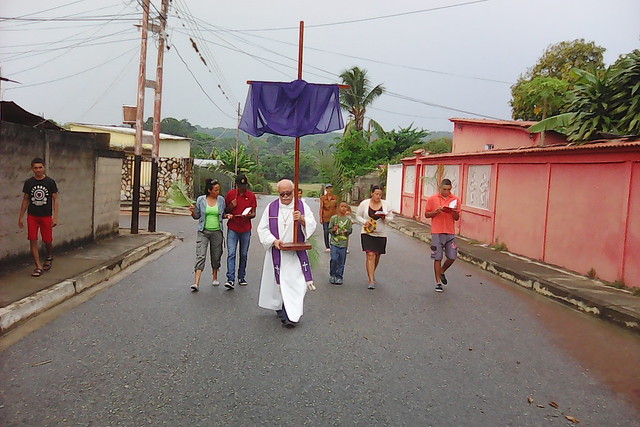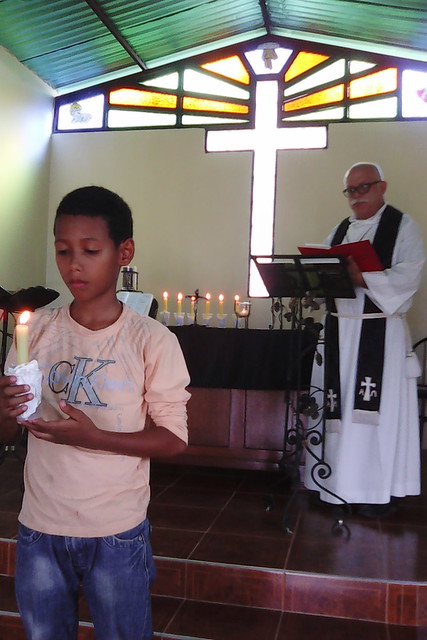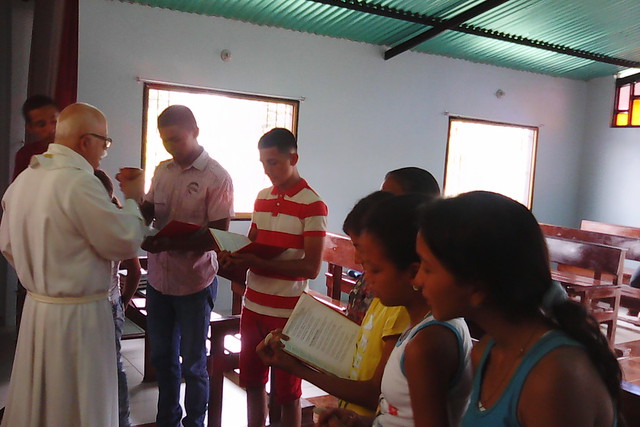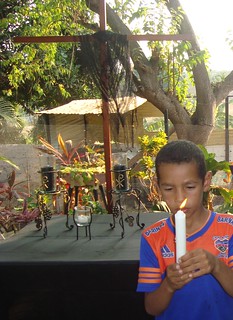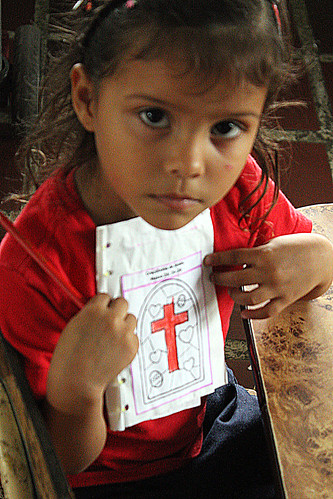| Reaffirmation of Alfonso Torres. |
| Psalm 37:4 |
Yaneth was the youngest at 18 months. Deisy brought Yaneth to our Sunday school classes and, from 2 to 6 years of age, Yaneth was a
Alfonso and his wife, Maria Cecilia, welcomed another daughter, Diana Carolina, and she was baptized on January 8, 2017 (the dedication of our current sanctuary). Diana also would attend our Sunday school and preschool. She received first communion on October 31, 2021.
Deisy’s daughter, Emely Antonella Estrada Torres, was baptized on December 24, 2017. Two more of Alfonso and Maria Cecilia's grandchildren, Jesuly and Josué Fernández Torres, were baptized on January 6, 2019. We received Maria Cecilia into membership by reaffirmation of faith on September 15, 2024.
Second part of the Sanctus
Of course, we began our observance of Holy Week seven days earlier, on Palm Sunday, April 13, 2025.
According to John 12:1, six days before the Feast of Passover Jesus arrived in Bethany, where He had raised Lazarus from the dead. When he left for Jerusalem the next morning, a large crowd came out of the city to greet him. Having heard of Lazarus's resurrection and Jesus' other signs, both the residents of Jerusalem and Passover pilgrims came out to greet him as the multitude had welcomed Simon Maccabeus when he entered to drive the Gentiles from the holy city (1 Maccabees 13:51). But Jesus did not approach Jerusalem as a conqueror coming to free Jerusalem from its oppressors and establish his kingdom by force. He was not mounted on a white charger, but on a donkey in fulfillment of Zechariah 9:9.
He entered Jerusalem as the true King of Kings whose “dominion shall be from sea even to sea, and from the river, the Euphrates, even to the ends of the earth”, but not to make war but to “speak peace to the nations” (Zechariah 9:10).
We remembered this mission with our annual procession of palms and, as we do every Sunday, sang with joy, “Hosanna, hosanna, hosanna in the highest! Blessed is he who comes in the name of the Lord!" in the second part of the Sanctus in our Holy Communion liturgy. As on the first Palm Sunday, the words are drawn from Psalm 118:25-26. The first part of the Sanctus is based on the prophet Isaiah 6:1-5.
The vocation of womanhood
April 13 also was the fifteenth birthday of Luz Maria’s granddaughter, Anyi Vanesa Garrido Santana. We celebrated her quinceañera that afternoon. The quinceañera is celebrated across Latin America as a religious and a social event that emphasizes the importance of family and society in the life of a young woman as she passes from childhood into adulthood. The Roman Catholic version includes a mass and vows to the Virgin Mary,
But in our Lutheran quinceañera reaffirmed her baptismal vows. She was baptized here on June 19, 2010. Her parents, along with the entire congregation, spoke the vows for her. Why repeat the baptismal vows at this time? Truly, we should remember our baptism daily, every time we pray in the name of the Trinity. Dr. Martin Luther said to remember your baptism every time you wash your face. But it was a special moment for Anyi to reaffirm her identity as a child of God as she contemplated her future direction in life. Especially because, as a woman, that might involve carrying new life in her womb, something no man will ever experience.Nor did we forget that most blessed among women, the mother of our Lord (Luke 1:28). When the angel told Mary heard that the fruit of her womb would be the Word made flesh, she simply said, “Behold, the handmaid of the Lord; be it to me according to your word.” (verse 38). When she heard nearly same words from her relative, Elizabeth, “Blessed are you among and blessed is the fruit of your womb”, Mary broke out into the song of praise we call the Magnificat (Luke 1:47-55). We sang it at Anyi’s quinceañera.
Come, Tell the Story of Salvation
After Palm Sunday, we began a vacation Bible school with the theme, "Come, Tell the Story of Salvation." There are many Pentecostal sects in our area that don't celebrate Holy Week. Their pastors tell them it's a pagan holiday. From Monday to Wednesday, we explained the biblical basis of Holy Week to 20 children. We encouraged them to use the chronology of Holy Week to tell their parents the story of Christ's death and resurrection. It also was the occasion to celebrate the seventh birthday of Emmanuel David Sanchez, Luz Maria’s grandson.
Maundy Thursday in Barinas
We celebrated Maundy Thursday with divine service at the Corpus Christi Lutheran Church in Barrio El Cambio, Barinas. The epistle designated for Maundy Thursday (1 Corinthians 11:23-32) contains the same words of institution of the Lord's Supper as in the three synoptic gospels. For Matthew, Mark, and Luke, it is part of their account of the Passover meal that Jesus shared with the apostles before his crucifixion. However, in John's gospel, we do not find these words, but rather the story of Jesus washing his disciples' feet. In the ancient world, footwashing helped prepare people for specific tasks.
In the Old Testament ritual context, footwashing was a symbol of purification. Priests were required to wash their hands and feet before entering the Holy Place and offering the sacrifice on the altar (Exodus 30:17-21; 40:30-32; 2 Chronicles 4:6). In Exodus 29:4 and Leviticus 8:6, footwashing is part of the priestly consecration rite. There are parallels in Greco-Roman literature. In the works of Homer and Strabo, people routinely wash their feet before entering a sacred place.
We observed Good Friday at La Caramuca with a Tenebrae service. This liturgical ceremony originated seven or eight centuries after Christ. The purpose of this service was to remember the dark moments that occurred in Jesus' life, from his euphoric entry into Jerusalem on Palm Sunday until the night of Jesus' burial on Good Friday. The most notable aspect of the service is several lit candlesextinguished one by one while Scripture readings are shared to tell the story of Holy Week.




















